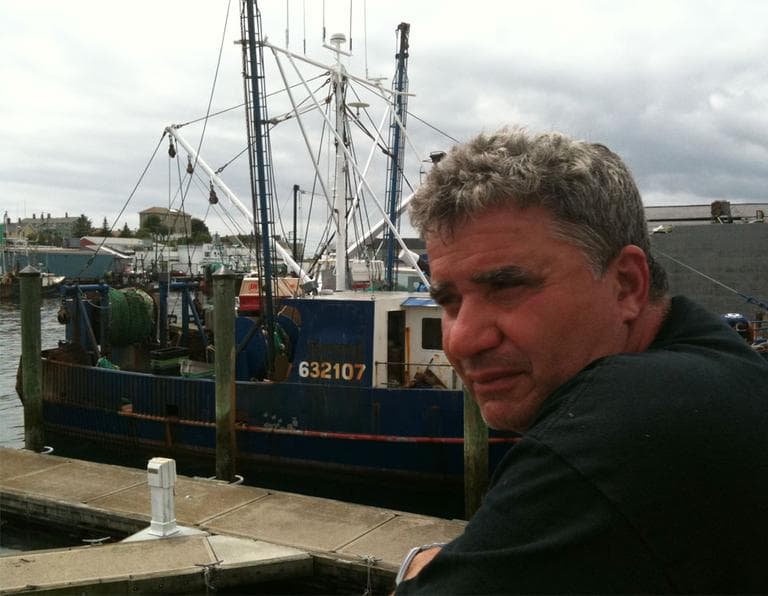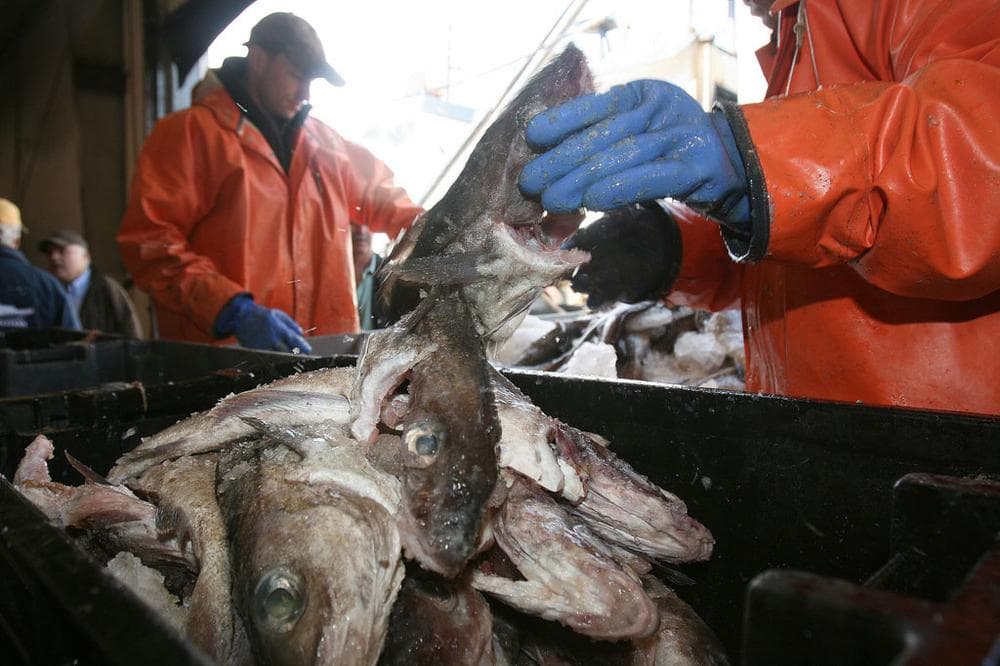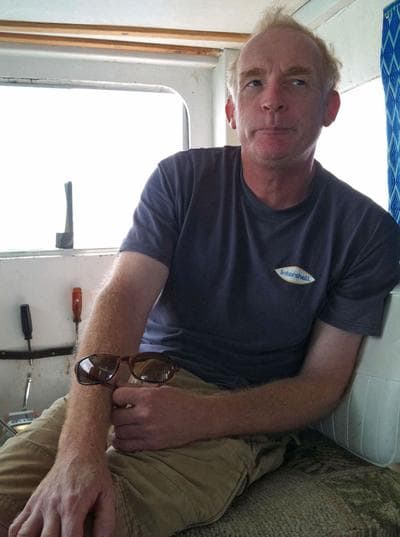Advertisement
Gloucester Fishermen Resigned To Catch Share

It's been a year and a half since the fishing industry in Massachusetts experienced a radical change: new regulations on the number of fish fishermen are allowed to reel in.
The day the program — called catch share, or sector management — began, WBUR traveled to Gloucester, the oldest fishing port in America, where fishermen were outraged by the new system.
"We the fishermen are going to be making roughly 25 percent of what we made before," Richard Burgess, who runs a fishing business with his two cousins, said in April 2010. "I'm estimating 70 to 75 to 80 percent of the fleet will be bankrupt by October."
As it turns out, a year and a half later, Burgess says about a quarter of the boats are out of business.
How's Catch Share Working?
“When catch shares first came into play, I was totally against it," said Gloucester fisherman Joe Orlando, who captains the medium-sized Padre Pio. "It was like anything else, something new comes in. And I didn’t like it; who would? But working through it, you know, it’s kinda worked out for me."

Under the new catch-share system, every fisherman receives an allocation for how many fish he or she can catch that year. Orlando uses his boat to catch his annual allotment of groundfish, like haddock, cod and monkfish.
Unlike the old system for managing the fish stocks, called days at sea, Orlando can fish whenever he wants, as long as he doesn't catch more than his allocation.
Orlando is doing well under the catch-share system, even though he was allocated fewer fish than what he caught before the new system began.
"The biggest problem is, 'the feds' just didn’t give guys enough fish to go fishin'," Orlando said. "Some guys got a good amount of fish and some guys didn’t. I’m doing well, but 10 other guys ain’t. The other 10 are crying and I don’t blame 'em."
Orlando made it because he supplemented his allocation by paying other fishermen to let him fish their quota. Not all of Gloucester's fishermen were able to do that.
Advertisement
Orlando now has to think differently about the way he fishes because he's leasing fish before he even catches them. For example, before he goes fishing on a given day, he now checks to make sure that the market price of the fish he'll catch is enough to let him recoup the cost of running his boat, the cost of leasing the fishing allocation and the interest on the $200,000 loan he had to take out to pay for that lease.
"If you’re leasing fish for a dollar, you gotta make at least $2.50 to make a dollar a pound," Orlando said. "You gotta make $1 a pound to make a go of it, otherwise you ain’t gonna do it."
'A Good System For Most'
"We think it’s a good system for most," said Pat Kurkul, the regional administrator for the National Oceanic and Atmospheric Agency (NOAA), which enforces the new system. "There’s not everybody who’s going to feel that way or that’s going to survive under it, but that’s true ... in every kind of business. There are people that do better than others."
The agency is tracking how the changes have affected the region's fishing industry. The people who are doing better under catch shares seem to be the larger fishing boats, according to NOAA's preliminary research.
But Kurkul says even though smaller fishing boats are catching fewer fish, overall, everyone who's fishing is making more money.
"We do see an increase in prices, and we think that can be attributed, in part, to the sector system," Kurkul said, "because people now have the flexibility to fish when prices are higher. And so they can time their fishing to the markets better."
"The requirement now to have access to capital and be a brilliant businessman now trumps your skills as a fisherman."
Vito Giacalone, Northeast Seafood Coalition
But some worry about asking too much of Gloucester's fishermen.
"The requirement now to have access to capital and be a brilliant businessman now trumps your skills as a fisherman," said Vito Giacalone, the policy director of the Northeast Seafood Coalition and a part-time fisherman. "And that, to me, sucks, I think. That’s the part that kind of kills the fishing game."
Giacalone, who was was active in trying to help Gloucester's fishing industry adapt to the new system, is frustrated that his fellow fishermen in the city received low allocations. Up and down the coast, as many as two-thirds of Massachusetts fishermen were allocated fewer fish under catch shares than they caught in the years just before the program started, according to the Massachusetts Marine Fisheries Institute.
"Some excellent fishermen who are also very good businessmen are saying, 'My God, knowing what I know and as much as I love fishing, do I really want to extend myself financially beyond where I’m at?'" Giacalone said. "Because that’s really the choice you’re given right now. Either you super-extend yourself and be successful, or you liquidate."
Early numbers suggest that Gloucester's fishing industry is consolidating as fewer boats catch more of the fish.
To NOAA, that's not necessarily a bad thing. Kurkul says having too many boats fishing in the Northeast contributed to the over-fishing of local species in the first place.
"Over time, we will see this equalization between what the resource can support and the number of vessels out there, and we’ll see much healthier fishing vessels out there," Kurkul said. "A healthier resource is going to lead to healthier fishing businesses and healthier fishing communities. So, we’re still in a transition, but that will be the end result of this."
NOAA expects to have a final report on the first year of catch share sometime this fall.
The Cultural Impact
Gloucester fishermen also say catch share is having an impact that cannot be quantified. With its proud history of small, independent fishing boats, the cultural effect here has been profound.
Don Smith, one of the city's remaining boat captains, is nostalgic.

"I mean we're just doing it now because we're stubborn and we don't know what else to do," Smith said. "There really isn't anything else that I'm prepared to do at this point in my life. I'll be in there until the end."
What worries Smith is that "the end" is not too far off, as he'll retire in the next five or 10 years.
Smith's cousin is Burgess, the fisherman who last year predicted catch shares would eliminate up to 80 percent of Gloucester's fleet. Burgess and Smith co-own their fishing operation, and, like Orlando, they're surviving by leasing other fishermen's allocations.
"A lot of us are near the end of the line and there's nobody to take our place," Smith said. "Somebody will be taking our place but it'll be on a big corporate boat, it won't be an operation like [ours]."
When pressed, though, Smith can't make a compelling economic argument against catch share. He admits it's working, to a degree, and he's getting by.
"I guess just the fact that it's always been free out here," he said. "Tradition. Killing a tradition, killing a way of life. Putting a guy out of business, that was sort of just doing his thing. Non-economic reasons, I guess, huh?"
Gloucester is one of the many Massachusetts fishing communities working under the catch-share system — all of whom are still assessing the effects of the program.
This program aired on August 25, 2011.